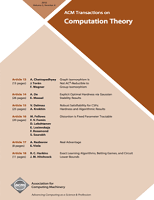
ACM Transactions on Computation Theory
Scope & Guideline
Driving Innovation in Computational Theory and Mathematics.
Introduction
Aims and Scopes
- Complexity Theory:
Research in this area examines the inherent difficulty of computational problems, categorizing them into complexity classes and exploring relationships between these classes. - Algorithm Design and Analysis:
The journal publishes studies on the design and analysis of algorithms, including both classical and advanced techniques for solving computational problems efficiently. - Parameterized and Exact Algorithms:
A focus on parameterized complexity and exact algorithms, investigating the computational feasibility of problems based on certain parameters. - Quantum Computing:
Exploration of computational models based on quantum mechanics, including the complexity of quantum algorithms and their potential applications. - Graph Theory and Combinatorial Structures:
Research in this domain covers graph algorithms, combinatorial optimization, and the study of various combinatorial structures relevant to computation. - Statistical and Probabilistic Methods:
The journal addresses the use of statistical techniques in computational problems, including randomized algorithms and probabilistic analysis.
Trending and Emerging
- Spectral and Linear Algebra Techniques:
An increasing number of papers utilize spectral methods and linear algebra to address problems in computational theory, signaling a trend towards leveraging these mathematical tools for algorithmic design. - Quantum Algorithms and Complexity:
The rise in research focused on quantum algorithms and their complexity indicates a growing interest in understanding the implications of quantum computing for traditional computational problems. - Parameterized Complexity and Approximation:
There is a notable trend towards exploring parameterized complexity and approximation algorithms, reflecting a shift in interest towards more nuanced problem-solving approaches in computational theory. - Interdisciplinary Applications:
Emerging themes show a focus on the application of computational theory to other fields such as machine learning, network theory, and data science, indicating a trend towards interdisciplinary research. - Dynamic and Adaptive Algorithms:
Research is increasingly focusing on dynamic algorithms that adapt to changing inputs, reflecting the need for algorithms that can efficiently handle real-time data.
Declining or Waning
- Classical Complexity Classes:
Research on traditional complexity classes like P, NP, and PSPACE has diminished, possibly due to a saturation of foundational results and a shift towards more nuanced or applied aspects of complexity. - Basic Graph Algorithms:
While still important, basic graph algorithms have become less prevalent as researchers move towards more complex and nuanced algorithmic challenges that involve broader computational frameworks. - Static Models of Computation:
Static models have seen a reduction in focus as dynamic and adaptive computation models gain prominence, reflecting the evolving nature of computational problems in real-world applications.
Similar Journals

ALGORITHMICA
Shaping the Future of Algorithmic Research and DevelopmentALGORITHMICA is a premier academic journal published by SPRINGER, dedicated to the field of algorithms and their applications across various domains. With an ISSN of 0178-4617 and an E-ISSN of 1432-0541, this journal serves as a vital resource for researchers and practitioners interested in the theoretical and practical aspects of algorithmic design and analysis. Recognized for its high impact, ALGORITHMICA is listed in the top quartile (Q1) for Applied Mathematics and Computer Science (miscellaneous) and is positioned in Q2 for Computer Science Applications in the 2023 category rankings. The journal has continuously contributed to advancing knowledge from its inception in 1986 to its ongoing publications through 2024. With a commitment to rigorous peer review and high-quality research, ALGORITHMICA is essential for anyone serious about pushing the boundaries of algorithmic study and application.

Australasian Journal of Combinatorics
Exploring New Dimensions in CombinatoricsThe Australasian Journal of Combinatorics, published by the CENTRE DISCRETE MATHEMATICS & COMPUTING, serves as a vital platform for researchers and professionals engaged in the dynamic field of discrete mathematics and combinatorics. With an ISSN of 2202-3518 and an E-ISSN of the same, this journal has been committed to open access since 2014, ensuring that groundbreaking research is readily available to a global audience. Based in Australia, specifically at the Department of Mathematics, University of Queensland, this journal spans the years from 1996 to 2024, showcasing the evolution of combinatorial research over nearly three decades. Recognized in the 2023 category quartiles as Q3 in Discrete Mathematics and Combinatorics, it ranks 68th out of 92 in Scopus, reflecting its growing influence despite its current percentile of 26th. The Australasian Journal of Combinatorics is dedicated to fostering innovative research and theoretical development, making it a valuable resource for academics and students alike.
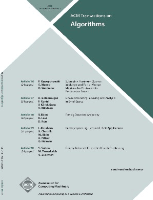
ACM Transactions on Algorithms
Transforming Ideas into Algorithmic ExcellenceACM Transactions on Algorithms (ISSN: 1549-6325, E-ISSN: 1549-6333) is an esteemed academic journal published by the Association for Computing Machinery (ACM), dedicated to advancing the field of algorithms within the broad domain of mathematics. With an impressive 2023 Quartile Ranking of Q1 in Mathematics (miscellaneous) and a Scopus rank placing it in the 15th percentile of its category, this journal is a pivotal resource for researchers, professionals, and students alike. Covering topics from algorithm design and analysis to applications in diverse areas, it serves as a platform for publishing high-quality, peer-reviewed research that significantly contributes to theoretical advancements and practical implementations. Although it is not an open-access journal, its impact in the academic community is profound, ensuring that vital findings reach a wide audience while promoting innovation and excellence in algorithm research. Established in 2005, with contributions continuing through 2024, ACM Transactions on Algorithms remains at the forefront of its field, underpinning significant developments and collaborations in algorithmic research.

Theoretical Computer Science
Bridging Theory and Application in Computer ScienceTheoretical Computer Science, published by Elsevier, serves as a pivotal platform in the field of computational theory, exploring the foundational aspects of computer science and mathematical logic since its inception in 1975. With both a print ISSN of 0304-3975 and an E-ISSN of 1879-2294, this journal is esteemed for its rigorous peer-review process and commitment to advancing knowledge in theoretical frameworks and algorithms. Positioned in the Q2 quartile for both Computer Science (miscellaneous) and Theoretical Computer Science categories, it ranks #124 out of 232 in general computer science and #73 out of 130 in theoretical computer science according to Scopus metrics, reflecting its significant influence and reach within the academic community. Researchers and professionals can access this journal through institutional subscriptions, providing a plethora of high-quality articles that contribute to ongoing debates and developments in the discipline. The journal's scope encompasses a wide array of topics, ensuring relevance across various subfields, thus making it an essential resource for anyone dedicated to furthering their understanding of theoretical computer science.
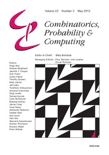
COMBINATORICS PROBABILITY & COMPUTING
Shaping the Future of Probability and Combinatorial ScienceCOMBINATORICS PROBABILITY & COMPUTING is a premier journal published by Cambridge University Press, focusing on the cutting-edge fields of combinatorics, probability, and their computational aspects. Established in 1992 and set to continue its impactful discourse through 2024, this journal holds a distinguished reputation, reflected in its Q1 ranking in applied mathematics, computational theory, and statistics, showcasing its pivotal role in advancing research in these areas. With an ISSN of 0963-5483 and an E-ISSN of 1469-2163, the journal welcomes high-quality papers that contribute to the theoretical foundations and practical applications of the disciplines. While it is not available as open access, its accessibility through institutional subscriptions ensures wide readership within academia. The journal is a vital resource for researchers, professionals, and students alike, providing a platform for innovative ideas and pioneering research that shapes the future of mathematics and computer science.
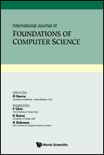
INTERNATIONAL JOURNAL OF FOUNDATIONS OF COMPUTER SCIENCE
Pioneering Research in Computer Science FoundationsThe International Journal of Foundations of Computer Science, published by World Scientific Publishing Co Pte Ltd, is a premier repository for cutting-edge research in the field of computer science, emphasizing foundational theories and methodologies. With an ISSN of 0129-0541 and an E-ISSN of 1793-6373, this journal has established itself as a valuable resource since its inception in 2000, continuously contributing to scholarly discourse up to the present year, 2024. It is ranked in the Q2 quartile of computer science categories, indicating its notable impact and relevance within the academic community, particularly in miscellaneous subsections of the field. While it does not currently offer open access options, it remains a crucial platform for researchers, professionals, and students seeking to deepen their understanding of computational foundations, algorithms, and theoretical frameworks. The journal encourages submissions that push the boundaries of knowledge and invites innovative approaches that address contemporary challenges in computer science.

FOUNDATIONS OF COMPUTATIONAL MATHEMATICS
Unveiling cutting-edge methodologies in computational mathematics.Foundations of Computational Mathematics, published by Springer, is a premier journal dedicated to the advancement of research in the field of computational mathematics. With an impressive impact factor attributable to its rigorous peer-review process and high-quality publications, this journal is recognized globally, featuring in the prestigious Q1 quartile across various categories including Analysis, Applied Mathematics, Computational Mathematics, and Computational Theory and Mathematics. With a commitment to fostering innovative research, the journal welcomes original research articles, reviews, and notes that contribute to the theoretical foundations and practical applications of computational methods. Its Scopus rankings reflect its significant standing in the academic community, providing an essential platform for scholars, researchers, and students to disseminate their findings and engage with groundbreaking mathematical advances. For those seeking to stay at the forefront of the discipline, Foundations of Computational Mathematics offers invaluable insights and is a critical resource for fostering intellectual discourse and collaboration.
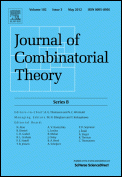
JOURNAL OF COMBINATORIAL THEORY SERIES B
Championing Excellence in Discrete MathematicsJOURNAL OF COMBINATORIAL THEORY SERIES B, published by Academic Press Inc., Elsevier Science, is an esteemed journal within the discipline of combinatorial theory, discrete mathematics, and theoretical computer science. With a rich history since its inception in 1971 and ongoing publication through 2025, this journal has established itself as a pillar in its field, currently holding Q1 category rankings in multiple areas including Computational Theory and Mathematics, Discrete Mathematics and Combinatorics, and Theoretical Computer Science. The journal features cutting-edge research and developments, attracting contributions from both established professionals and emerging scholars. Despite the absence of an open access option, the journal's strong impact reflected in its Scopus ranks—such as being number 16 out of 92 in Discrete Mathematics and Combinatorics (83rd percentile)—signifies its influential role in advancing knowledge and innovation. Researchers seeking to share impactful findings and connect with a vibrant academic community will find the JOURNAL OF COMBINATORIAL THEORY SERIES B an essential resource.

Communications in Combinatorics and Optimization
Advancing the Frontiers of Combinatorial ResearchCommunications in Combinatorics and Optimization is a prestigious open-access journal published by Azerbaijan Shahid Madani University, focused on advancing research in the fields of combinatorial mathematics and optimization. Since its inception in 2016, the journal has established a reputation for disseminating high-quality research, achieving a commendable Q2 ranking in both Control and Optimization and Discrete Mathematics and Combinatorics as of 2023. With a Scopus ranking of #13 in Discrete Mathematics and Combinatorics, it is positioned in the top 14% of its field, underscoring its significance in the academic community. By providing unrestricted access to its articles, the journal promotes the widespread dissemination of knowledge, fostering collaboration and innovation among researchers, professionals, and students around the globe. Based in Iran, the journal continues to contribute to the global discourse on effective combinatorial and optimization techniques that address contemporary challenges.

THEORY OF COMPUTING SYSTEMS
Fostering Interdisciplinary Dialogue in Computing TheoryTHEORY OF COMPUTING SYSTEMS, published by SPRINGER, is a renowned journal that has been a cornerstone in the fields of computational theory and theoretical computer science since its inception in 1996. With an ISSN of 1432-4350 and an E-ISSN of 1433-0490, this journal is committed to disseminating high-quality research that explores the underlying principles of computing systems and their theoretical foundations. Positioned in the Q2 category for both Computational Theory and Mathematics and Theoretical Computer Science, it plays a vital role in advancing scholarly dialogue and innovation within these disciplines, as evidenced by its rankings within the Scopus index. Researchers and professionals can access this journal in various formats, ensuring that cutting-edge research is readily available for a global audience. With a clear focus on fostering interdisciplinary collaboration and exploring emerging trends, THEORY OF COMPUTING SYSTEMS is essential reading for anyone interested in the evolution of computing theory and its applications.